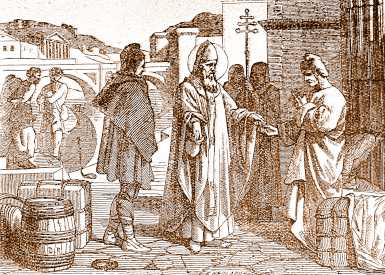Lives of the Saints
Our Models and Protectors
Spiritual Bouquet:
March 15

Saint Zachary
Pope
(† 752)
Saint Zachary, a native of Syria, was a Benedictine monk before being created a Cardinal-priest by Saint Gregory II. He succeeded to Pope Gregory III in 741, and was a man of singular meekness and goodness. He was elected at a time of troubles besetting all of Italy, during an invasion of Rome under the military conduct of the Lombardian king Luitprand. That king, dissatisfied with Rome's favor for certain sovereigns who were his own enemies, pillaged the Church of Saint Peter, and his warriors were pursuing their depredations in the Church's domains. The Pope had appealed for aid to Charles Martel in France against the invaders, but died before any assistance could reach the mother Church.
Saint Zachary, when chosen to replace the deceased Pontiff, at once sent a letter of conciliation to the Lombard king, who was touched and conceived much respect for the new Vicar of Christ, and apparently was ready to accede to all he proposed. The new Pontiff went in person to the king, who was troubling other regions, and a treaty of peace was concluded. The Pope invited the king to a dinner which greatly pleased him, and Luitprand restored to the Church of Rome all the domains which belonged to it, and sent back the captives without ransom. He nonetheless began invading again in the north, but again Saint Zachary left Rome to go to Ravenna and meet with him. He appeased the king's resentments and settled the problems temporarily. When Luitprand died not long afterwards, the Lombards, who wanted peace, for twenty years ceased their wars.
The zeal and prudence of this holy Pope appeared in many wholesome regulations which he instituted to reform or settle the discipline and peace of several churches. It was Saint Zachary who sent Saint Boniface as papal legate to the Franks of Gaul and Germany, and through him they recognized the high moral power of the papacy. Certain Venetian merchants having bought at Rome many slaves to sell to the Moors in Africa, Saint Zachary forbade such iniquitous traffic, and, paying the merchants their price, gave the slaves their liberty. He arrested three new heresies in northern regions, and found time to translate the Dialogues of Saint Gregory the Great. Two princes of high rank were converted, one the son of Charles Martel, who became a monk and built a monastery in honor of Saint Sylvester. The other was the successor to Luitprand as king of the Lombards; to better serve God, he descended from the throne and with his wife and daughter entered religious life at the monastery of Monte Cassino.
Saint Zachary was very zealous in the restoration of the churches of Rome, to which he made costly gifts. He also restored the Lateran palace and established several large domains as settled landed possessions of the Church of Rome. He adorned Rome with sacred buildings and with great foundations on behalf of pilgrims and the poor. He died on March 3, 752, and was interred in the Church of Saint Peter on March 15th of that year.
Les Petits Bollandistes: Vies des Saints, by Msgr. Paul Guérin (Bloud et Barral: Paris, 1882), Vol. 3; Little Pictorial Lives of the Saints, a compilation based on Butler's Lives of the Saints and other sources by John Gilmary Shea (Benziger Brothers: New York, 1894).